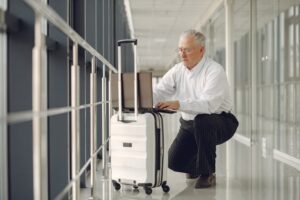The Canada Border Services Agency (CBSA) reminds senior travellers that it can be extra busy at the border over the Easter long weekend.
Every day, the CBSA works hard to protect Canadians, support the economy and ensure the safe and efficient movement of people and goods across the border. In 2024, they welcomed over 93.4 million travellers, stopped over 34,400 kg of illegal drugs from entering our communities and kept more than 17,200 weapons and 930 firearms off our streets.
The CBSA plans and prepares for peak periods, including long weekends and summer months. They monitor traveller volumes and take measures to minimize border wait times at land ports of entry and at international airports, without compromising safety and security.
Here are some travel tips to help you plan for your trip:
- Driving into Canada? Check border wait times and expect delays.
- Early mornings are the best time to cross the border to avoid wait times.
- The Monday of holiday long weekends tend to be the busiest.
- Consider an alternative port of entry with shorter wait times or less traffic.
- Check the port of entry’s hours of operation on the official CBSA Directory of Offices and Services.
- If you are using a GPS application (such as Google Maps, Apple Maps or Waze) to direct you to a port of entry, consider checking different navigation options (such as fastest and shortest routes) to determine the preferred route of travel.
- Have your travel documents handy. This will speed up processing times at the border.
- Be prepared to declare. Declare everything you have with you upon entry into Canada. If arriving by land, you are responsible for everything inside your vehicle.
- Goods purchased abroad: If you are a resident of Canada, personal exemptions allow you to bring goods, including alcohol and tobacco (up to a certain value), back to Canada without paying regular duty and taxes. Make sure you know how much you are bringing back in Canadian dollars and have your receipts readily available for the officer.
- Surtaxes on certain US goods. If you’ve purchased goods in the U.S. and are bringing them into Canada, you may have to pay a 25% surtax in addition to regular duties and taxes. For residents of Canada, this surtax applies only to goods exceeding your personal exemptions limit. Consult the lists of products surtaxed as of March 4, as of March 13, and April 9 (U.S.-made vehicles). Visit the CBSA website for more details on how these surtaxes apply at the border.
- Visitors to Canada may also bring gifts for their friends and family as long as the gifts are unwrapped or in gift bags, in case border services officers need to inspect the contents.
- You can bring in Easter chocolate as long as it’s for personal use and doesn’t exceed a certain weight.
- Flying into Canada? Use Advance Declaration and make your customs and immigration declaration up to 72 hours in advance of your arrival into Canada at participating airports.
- When travelling with children, who are not your own or for whom you don’t have full legal custody, we recommend you have a consent letter from the parent or legal guardian authorizing you to travel with the child. We are always watching for missing children, and in the absence of the letter, officers may ask additional questions.
- Know before you go: review the restricted and prohibited goods to avoid the possibility of penalties, including fines, seizure or prosecution. Make sure you have the information you need before attempting to bring items into Canada.
- Leave behind: firearms, weapons, narcotics and cannabis.
- We encourage you to read and follow all of our travel tips before arriving at the border.
Not sure? Ask a CBSA officer. The best way to save time is to be open and honest with the border services officer. If you are not sure about what to declare, don’t hesitate to ask!
For more information, visit the CBSA website or call us at 1-800-461-9999.








